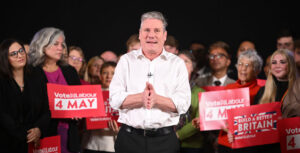After months of speculation, the beleaguered Conservative prime minister summoned the cameras to Downing Street to make a special announcement. The economy was stagnating and his attempts to bring down inflation had been hammered by an energy crisis. Public sector strikes ground vital industries to a halt. And while some politicians looked towards Europe to boost trade, the deal that the PM had struck was seen as both bad for British business and a “betrayal” of sovereignty. Abroad, newspapers were shocked at how quickly Britain had lost its standing in the world. French and German publications wrote about the economic situation as the “Final Scene of the British Post-War Tragedy”. The New York Times, always eager to stick the boot in, told their readers that Britain was as divided as it was in the much-maligned Thirties.
Calling a general election, the Prime Minister said that there were “grave problems” facing the country “at home and abroad”. He then posed the question: “Do you want a strong government which has clear authority for the future to take the decisions which will be needed? Do you want Parliament and the elected government to continue to fight strenuously against inflation?” With the government seemingly unable to control events, the media dubbed the election a question of: “who governs?”
Far from a prediction of how Rishi Sunak will appeal to the voters at the next election, this was the ultimatum Edward Heath was forced to confront 50 years ago today. Heath had never planned to stake his leadership on a “crisis” election, but running out of options, and with the miners on strike, he felt he had little choice. However, putting the demand of “who governs?” on the table, he turned the election into a much wider debate about Britain’s place in an ever-changing world.
When Sunak and Starmer hit the campaign trail later this year, the same question will be asked about which has the right economic plan to steer Britain out of its post-Brexit malaise. Because, even after 13 years of Conservative rule, there appears to be broad political agreement that the way things are run in Britain needs to change.
Each new Conservative Prime Minister in this parliament has argued for a radical break with the economic consensus of the past. For Boris Johnson, levelling up was our shot at turning around one the most “imbalanced societies and lop-sided economies” in Europe. Then, Liz Truss declared that her plan to transform Britain into a low-tax, high-growth economy would reverse the “current trajectory of managed decline” which spanned back to the Eighties. Even Sunak flirted with the idea of breaking with Treasury orthodoxy. There are “30 years of vested interests standing in the way of change”, he observed in his speech to party conference last September. “Thirty years of rhetorical ambition which achieves little more than a short-term headline”.
Fifty years ago, Edward Heath had grand ambitions to turbocharge the British economy and make businesses more competitive. Part of this meant bringing back some control to the government by introducing trade-union restrictions. The other aspect involved handing some power to Brussels, by joining the EEC and pooling sovereignty to have greater influence. “We shall have to bring about a change so radical, a revolution so quiet, and yet so total, that it will go far beyond the programme for a parliament,” he had told the Conservative conference in 1970. Yet competing pressures meant that Heath was unable to deliver it. As the historian Tim Bale has argued, the Heath government brought “derision and despair” by exercising “a series of screeching U-turns” on everything from public spending to nationalisation, pay policy, and immigration.
Just as today, there were many within the Conservative ranks wondering what it actually stood for. “It is fatal.” Enoch Powell argued in one stormy Commons debate, “for any government, party or person to seek to govern in direct opposition to the principles with which they were entrusted with the right to govern.”
Even the most famous Conservative supporter had turned against the party in the face of the U-turns. Alf Garnett was the Marxist-hating, immigrant-bashing, Tory patriot in the hit sitcom Till Death Us Do Part. The show was rooted in the politics of the age with each episode set against heated debates between Alf and his socialist son-in-law about the future of Britain.
When Series 4 aired in 1972, Garnett was delighted with Heath and the rapid rise in house prices, which meant that his “slum” had risen in value from £600 to £20,000. “They’ve only been in office two years!” But by the time the series returned, during the 1974 election campaign, he had lost faith in the Tories. The docks, where he worked, had been ruined by the militants. The BBC had been taken over by Left-wingers (which meant he refused to pay the TV licence) and Heath had gone “barmy” by giving in too easily. Alf longed for the return of Winston Churchill to sort the country out: “He’s worth 50 of that rubbish we’ve got in the Houses of Parliament now!”.
Yet Till Death Us Do Part merely tapped into broader contempt for the way that politicians had failed to deliver on their promises. “Parliament is an increasingly irrelevant charade,” the former Labour MP Woodrow Wyatt wrote at the time, a “repository of illusions and a graveyard of talents that is culpably out of touch with the complex needs of modern society”.
As the “who governs?” campaign played out over the course of February 1974, it was clear that the public had little faith in either party’s leadership. Louis Harris, the US pollster, reported that 88% of voters “thought things are going very badly for Britain in the way it is being run”. Yet polling also showed that 60% of voters felt unable to “make their voices heard by leaders”. Election gurus David Butler and Dennis Kavanagh concluded that there was “a realisation that the country faced serious problems but that the parties hardly seemed to match the challenge”.
Most Labour MPs believed there would be no “silver bullet” to turn the economy around. Anthony Crosland, the optimistic author of The Future of Socialism in the Fifties, was now talking about the need for austerity measures to respond to the oil shock. “Domestic living standards must be ruthlessly held back,” he said in a London speech. “Many expectations will be sharply disappointed”. The Shadow Chancellor Denis Healey warned party members that they too would have to pay more taxes. And when Jim Callaghan unveiled Labour’s manifesto in early 1974, he admitted that voters “would not get something for nothing”: “We are all going to have a pretty tough time”.
Critics, such as the veteran political commentator James Margach, couldn’t help but wonder what had happened to Labour’s idealism. “In 40 years’ experience,” he wrote in The Sunday Times, “I have never known such an impotent opposition.” Perhaps unsurprisingly, when the votes were cast on election day, there was no clear mandate for either Heath or Wilson. The Tories received the most votes but Labour won more seats. Neither could put together a majority and when Heath failed to strike a deal with the Liberal leader Jeremy Thorpe, Labour were back in power by the barest of margins.
Half a century later, the political atmosphere feels eerily similar. The public is unhappy about the way that successive governments have managed Brexit and its failure to deliver on the economic promise to “level up” Britain. But the discontent is part of a broader, long-term disenchantment with the way Westminster works. In his study Britain since the turn of the century, All in This Together, Alwyn Turner paints a picture of steady erosion in public institutions, from the Iraq War to the financial crash, to the expenses and phone-hacking scandals. Among many others, we can add the Windrush and Post Office affairs to the list, both of which have left the public confused about who is accountable for mistakes that were made.
All of which brings the question of “who governs?” back to the centre of the national debate. Since becoming Prime Minister, Rishi Sunak has alienated Conservative voters by struggling to meet their demands on issues such as immigration. Faith in policies such as the Rwanda Bill are low, with just 1% of voters reportedly believing it will “stop the boats” as he has promised.
Failure to deliver while in office has already forced Conservative figures to think about the question of who governs Britain. Last week, Liz Truss went to America and implied that a “deep state” of “quangos and bureaucrats and lawyers” had brought her down. Closer to home, the former Conservative deputy chairman Lee Anderson controversially claimed that Mayor Sadiq Khan has given control of London to his Islamist “mates”.
All of this points to a government that has lost control of events, just as Heath did 50 years ago. Across the aisle, meanwhile, Starmer’s poll lead means that people are already speculating on how he will govern. The crisis sparked by Covid-19 was “a call to arms” like 1945, he argued in 2020. “I believe people are now looking for more from their government — like they were after the Second World War.” Yet just a few weeks ago, he talked about creating a politics that “treads a little lighter on all of our lives”. Likewise, the appointment of Sue Gray as Starmer’s chief of staff appeared to signal that Labour were preparing for government by looking at how decisions are actually made. But there are already fears that the party is engaging in “expectation management” as they U-turn on a series of pledges, from the bankers’ bonus tax to the £28-billion green prosperity fund. And with each reversal, the chorus of internal critics only gets louder.
Back in 1974, Harold Wilson asked the voters to put faith in him to “bring about a dramatic change for the better in industrial relations”. In a speech in Nottingham, he talked about “thrashing out problems round a table, conciliation, consensus, not this endless conflict and confrontation”. But without a plan for economic reform, his government was unable to achieve those aims. After the Winter of Discontent in 1979, Labour were cast into the wilderness for 18 years. With the party likely to lose its seat in Rochdale this week, and a general election on the horizon, the question of “who governs?” could soon come to haunt its leadership. And while Starmer commands a significant poll lead, it is far from a guarantee of longevity. To achieve that, he’ll have to provide the answer that Wilson and Heath could not.
Disclaimer
Some of the posts we share are controversial and we do not necessarily agree with them in the whole extend. Sometimes we agree with the content or part of it but we do not agree with the narration or language. Nevertheless we find them somehow interesting, valuable and/or informative or we share them, because we strongly believe in freedom of speech, free press and journalism. We strongly encourage you to have a critical approach to all the content, do your own research and analysis to build your own opinion.
We would be glad to have your feedback.
Source: UnHerd Read the original article here: https://unherd.com/




